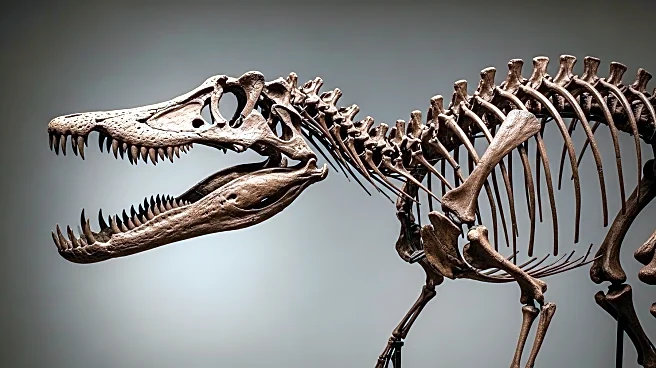What is the story about?
What's Happening?
Scientists have uncovered a new dinosaur species in Argentina, identified as Joaquinraptor casali, which belonged to the megaraptorans group. This dinosaur, estimated to be 23 feet long, was discovered with a crocodile bone in its jaws, suggesting its predatory nature. The fossils, found in the Lago Colhué Huapi rock formation in Patagonia, include parts of a skull, arm, leg, and tail bones. The discovery provides significant insights into the megaraptorans, known for their powerful claws and stretched-out skulls, although their hunting methods remain unclear due to incomplete fossil records.
Why It's Important?
The discovery of Joaquinraptor casali is crucial for paleontology as it fills a significant gap in understanding the megaraptorans, a mysterious group of dinosaurs. This find offers a more complete skeleton than previously available, aiding researchers in piecing together the evolutionary timeline of these predators. The presence of a crocodile bone in its jaws suggests diverse predatory strategies among dinosaurs, highlighting evolutionary adaptations. This discovery could reshape theories about dinosaur ecosystems and predator-prey dynamics during the Cretaceous period.
What's Next?
Further research is expected to focus on analyzing the newly discovered fossils to understand the hunting strategies and ecological role of Joaquinraptor casali. Scientists may conduct comparative studies with other megaraptorans to explore evolutionary pathways. The findings could lead to more excavations in Patagonia, potentially uncovering additional specimens that could provide deeper insights into the biodiversity and ecological interactions of prehistoric flood plains.
Beyond the Headlines
The naming of the dinosaur in memory of Lucio Ibiricu's son, Joaquin, adds a personal dimension to the scientific discovery, reflecting the human element in paleontological research. This highlights the emotional connections and motivations driving scientific exploration, which often go beyond mere academic interest.
















